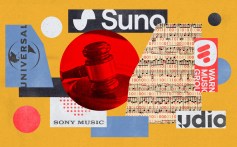Legal News
Page: 7
Trending on Billboard
Universal Music Group and Udio have settled their legal battle by striking a deal for a fully-licensed artificial intelligence music platform. But the broader litigation involving rival AI firm Suno and both Sony Music and Warner Music is still very much pending.
The deal, announced Wednesday, will end UMG’s allegations that Udio broke the law by training its AI models on vast troves of copyrighted songs. Under the agreement, Udio will pay a “compensatory” settlement and the two will partner on a new subscription AI service that pays fees to UMG and its artists, and allows artists to opt in to different aspects of the new service.
Related
But that agreement will not resolve the entire legal battle, in which all three majors teamed up last year to sue both Udio and Suno — the other leading AI music firm — for allegedly “trampling the rights of copyright owners” by infringing music on an “unimaginable scale.”
For now, Sony and Warner will continue to litigate their case against Udio, but a settlement like the one struck by UMG obviously creates a framework for them to reach a similar deal. The revamped Udio 2.0 will not be an exclusive UMG partner, according to sources close to the situation — meaning it’s able to strike similar catalog licensing deals with Sony and Warner, as well as any other parties.
Udio has ample incentive to do so. Past experience has shown that music licensing for tech platforms is something of a zero-sum proposition; it often doesn’t work for users if you have glaring gaps in your catalog of songs. Spotify wouldn’t be nearly as ubiquitous if it were missing catalogs by Taylor Swift, Drake or The Beatles, while TikTok’s standoff with UMG last year ended up impacting non-UMG recording artists like Beyoncé and Adele due to rights being owned by different companies.
In striking the deal, Udio has also effectively put its cards on the table: it wants to be the music industry’s AI good guy. Though not legally impossible, it’s hard to argue in court that you don’t need training licenses and artist consent while touting the benefits of both in press releases. Udio has also already made concrete changes to its platform, including controversially disabling downloads for its existing subscribers — a further sign that it’s no longer looking to fight it out.
Related
It’s worth noting that the settlement makes for odd bedfellows in any ongoing litigation. The same team of lawyers that repped UMG in its claims against Udio — now settled with a first-of-its-kind partnership — is also representing competitors Sony and Warner as they continue to sue that company. Ditto for Suno, which is defended by the same team of attorneys as Udio, which just agreed to sign a licensing deal that’s antithetical to Suno’s core argument that no such deals are needed.
But such situations are par for the course for cases like these, where industry rivals team up for a legal case, and each company on both sides almost certainly signed agreements waiving any legal right to argue that their lawyers have a conflict of interest.
The case against Suno, on the other hand, looks more likely to keep going. All three majors are still suing that company, and Suno has long been seen in industry circles as more the more combative of the two. One can’t imagine that Suno’s will to fight will be reduced by the Udio deal; if anything, it has a clearer runway to AI music dominance now that its largest text-to-audio rival has effectively left the space to cultivate its own walled-off garden.
The Suno lawsuit remains at the earliest stage, where a defendant will file a motion to dismiss a case, which is typically the first big ruling in a civil litigation. If both sides decide to fight it out, the case and resulting appeals could go on for years into the future. But the key battle lines of the litigation are already clear.
The multi-million-dollar question is whether training AI platforms like Suno on millions of unlicensed copyrighted songs counts as “fair use,” a legal doctrine that allows for the reuse of protected works in certain circumstances. That issue is also at the heart of dozens of other lawsuits filed against booming AI firms by book authors, news outlets, movie studios, comedians and visual artists — meaning it might really be more of a trillion-dollar question.
Can Suno prevail on that point, making Udio look silly for settling so early? The proverbial jury is very much still out.
Related
One federal judge, ruling on a major case against Anthropic, sided resoundingly with AI firms, saying that unlicensed training was clearly a fair use because it was no different than a human writer taking inspiration from copyrighted books they had read. But another judge ruled that such training would be illegal “in many circumstances” and that AI firms expected to generate “trillions” in profits “will figure out a way to compensate copyright holders.”
A separate, emerging flashpoint in the case is whether Suno broke the law by “stream-ripping” its training songs from YouTube. That’s a key issue in the wake of a court ruling this summer that said AI training on copyrighted works itself is fair use, but that using illegally-obtained works to do so could lead to billions in damages for AI firms.
In the wake of this week’s Udio settlement, the record labels likely see that deal as setting a helpful precedent: “See, AI companies do need licenses to train their models — Udio just took one.” And in that same vein, when it comes to that all-important courtroom battle over fair use, those same music companies likely view this week’s Udio deal as potential legal ammo.
A key factor in the fair-use analysis is whether exploiting a copyrighted work for free caused market harm — whether it hurt the ability of the original author to monetize their own creative output. A major licensing deal with a direct competitor would seem to be a very obvious market that would be harmed by the conduct of Suno, which says it can build its AI models without such deals.
But that argument has already been rejected in both of those earlier fair-use rulings. Even for the judge who said AI training would be illegal in most circumstances, that kind of argument would be “circular” — since essentially any copyright owner could argue that the specific thing they’re suing over is a lost market opportunity. That means the Udio deal might help the labels in the business world and the court of public opinion, but likely not in actual court. For now, time will tell.
For deeper reading, go check out the full lawsuits against Suno and Udio, and go read the responses from Suno and Udio. And stick with Billboard for updates as the cases move ahead.
Trending on Billboard
Disgraced hip-hop mogul Sean “Diddy” Combs was transferred to the federal correctional institution at Fort Dix, N.J. to serve out his 50-month sentence. The New York Times reported that a spokeswoman for the Bureau of Prisons confirmed on Thursday (Oct. 30) that 55-year-old Combs will be housed at FCI Fort Dix following his sentencing earlier this month to four years and two months in prison for two counts of transportation to engage in prostitution.
Explore
See latest videos, charts and news
Following his Oct. 3 sentencing, Combs’ lawyers asked judge Arun Subramanian to recommend that the Bureau of Prisons send their client to Fort Dix, “in order to address drug abuse issues and to maximize family visitation and rehabilitative efforts.”
Combs, who will get credit for time served in detention at the Metropolitan Detention Center (M.D.C.) in Brooklyn since his arrest in Sept. 2024, should be eligible for release in May 2028. During the eight-week trial, prosecutors called two of Combs’ former girlfriends to the stand to describe their participation in marathon, drug-fueled “freak-off” sex parties with hired male prostitutes. In July, the jury in the case acquitted Combs of the more serious charges of sex trafficking and racketeering conspiracy.
As he begins his time at Fort Dix, Combs’ lawyers are attempting to expedite his criminal appeal, arguing that he could be close to the end of his sentence by the time his case is heard if forced to follow the typical, drawn-out argument timeline. Combs’ team is challenging both his July conviction and the resulting four-year prison sentence in the case.
In the Second Circuit Court of Appeals where Combs’ case will be heard, it can take nearly a year and a half on average to get a criminal appeal decided and his lawyers don’t want to wait that long. In a court filing on Tuesday (Oct. 29) they said Combs could complete most of his sentence during the appeal timeline. Combs has already gotten credit for time spent in jail since his arrest and could have his sentence further reduced for good behavior or participation in a drug abuse rehab program.
ABC News reported that Combs’ legal team requested the Fort Dix facility because it offers a special drug treatment program that, if he completes it successfully, could take time off his sentence. ABC quoted sources saying that Combs is not being housed in the prison’s general population, but in the special drug program unit.
In filings from Combs’ team before his sentencing, they said that during his time at M.D.C. their client was sober for the first time in 25 years and that he had been leading an informal six-week business and entrepreneurship education program for other inmates he called “Free Game with Diddy.”
While rumors of a potential pardon from Donald Trump have been floated in the press, on Oct. 21 the White House Communications Office threw cold water on a TMZ report that had quoted a “high-ranking White House official” saying that the president was considering commuting Combs’ sentence soon. “There is zero truth to the TMZ report, which we would’ve gladly explained had they reached out before running their fake news,” the White House spokesperson said.
Just days after Diddy’s sentencing, Trump confirmed that the producer’s legal team had officially requested a presidential pardon. “A lot of people have asked me for pardons,” the president said at the time. “I call him Puff Daddy. He has asked me for a pardon.”
Trending on Billboard
A Korean court has rejected NewJeans’ attempt to break away from its label ADOR, dealing a major victory to the HYBE subsidiary in its closely-watched legal battle with the chart-topping K-pop group.
The five members of NewJeans — Minji, Hanni, Danielle, Haerin and Hyein — have been fighting since last November to leave ADOR and make music independently under the moniker NJZ. The women claim ADOR broke their trust with the controversial dismissal of their mentor, former CEO Min Hee-jin.
Related
However, ADOR has argued that NewJeans’ 2022 exclusive contract bars any independent activities until 2029. A legal battle ensued and, after months of back and forth, a Korean court sided with ADOR on Thursday (Oct. 30).
According to Korean news reports, a judge in the Seoul Central District Court ruled that Min’s termination was not sufficient grounds for NewJeans to void its seven-year contract with ADOR.
“Nowhere in the exclusive contract is it stated that ADOR must entrust the management duties for NewJeans to Min Hee-jin,” wrote Presiding Judge Jeong Hoe-il, according to the Chosun Daily. “Merely the fact that NewJeans personally places high trust in Min Hee-jin does not make guaranteeing her the position of ADOR’s CEO a significant obligation under the exclusive contract.”
In an official statement on Thursday, ADOR expressed “deep gratitude for the court’s decision.”
Related
“We sincerely hope that today’s judgment, which comes after long-term verification of various claims and facts and reaffirms prior rulings, will serve as an opportunity for the artists to calmly reflect on this matter,” said the label. “ADOR is committed to re-emphasizing its role and responsibilities as NewJeans’ management agency. As we stated during the trial, we have completed preparations for the artist’s activities, including the release of a studio album, and are waiting. We will do our utmost to return to the fans through discussions with the artist.”
The NewJeans members, meanwhile, put out a statement through their lawyers saying they plan to appeal the decision.
“NewJeans members respect the court’s judgment, but it is impossible to return to this company and continue normal entertainment activities in the current situation where the trust relationship with ADOR is completely shattered,” said the law firm Shin & Kim, as reported by the Korea Times.
NewJeans’ legal battle with ADOR has captivated the K-pop world, where companies like HYBE hold immense power and artists rarely speak out against their labels.
The group found global success in 2023 with the EP Get Up, which debuted at No. 1 on the Billboard 200 and spent 26 weeks on the chart. The album’s lead single, “Super Shy,” peaked at No. 2 on the Billboard Global 200.
Trending on Billboard
Udio’s licensing deal with Universal Music Group (UMG) has prompted backlash from users angry that the AI platform abruptly disabled downloading — and some are already floating the idea of legal action.
The landmark deal, announced on Wednesday (Oct. 29), ends UMG’s involvement in copyright litigation against Udio and lays the groundwork for a new version of the platform trained on licensed music. The catch: Udio will now be a “walled garden” in which users can only stream their AI creations on the platform, with no ability to export and distribute their works.
Related
While this new version of Udio isn’t launching until 2026, the company immediately disabled all downloading on Wednesday — a move that has many users up in arms, especially on the r/udiomusic Reddit page.
“This feels like an absolute betrayal,” wrote one Reddit user.
“I’ve spent hundreds of $$$ and countless hours building tracks with this tool,” wrote another. “No one warned us that one day, we wouldn’t even be able to access our own music. You can’t just pull the plug and call that a ‘transition.’”
Udio offers both monthly and annual subscription plans. A Standard plan costs either $10 per month or $96 billed annually, and a Pro plan comes out to either $30 per month or $288 a year.
One unlucky Reddit user commented on Thursday (Oct. 30) that they paid for an annual subscription the day that Udio announced the UMG deal and took away download capabilities.
“I’m absolutely livid,” the user wrote. “The sole reason I paid for the service was to produce music to soundtrack short films for the students in my high school media class. Now no downloads?? This is the worst and most disgusting fraud I have ever seen. I don’t even care about the music, I just want my money.”
Related
In a statement to Billboard on Thursday, an Udio spokesperson said that disabling downloads is “a difficult but necessary step to support the next phase of the platform and the new experiences ahead.”
“We hate having to remove this functionality and did not make the decision lightly,” said the spokesperson. “To ease the transition, Udio is adding 1,200 credits to all Pro and Standard plans, increasing the Pro plan’s song creation limit to 10, and providing all subscribers with a one-time bonus of 1,000 non-expiring credits.”
On Reddit, Udio users are already chatting about potential recourse. Some comments say disgruntled users should ask Udio directly for refunds, while others suggest that individuals who’ve recently bought subscriptions contact their banks to cancel the charges.
Elsewhere on the Reddit page, as well as on other social media platforms like LinkedIn, users are floating the idea of litigation.
“What you have committed is fraud. Just so you understand,” wrote one user. “You may not feel any legal ramifications immediately, but not everyone who used your platform is without resources.”
Related
Numerous accounts have been posting Udio’s terms of service and encouraging others to send emails to the company formally opting out of provisions that could limit their legal options — namely, a clause requiring that all claims be brought in private, individual arbitration rather than in public court as a class action.
While Udio’s terms of service do indeed allow users to opt out of mandatory arbitration, opt-out notices must be sent within 30 days of registering for the service. “Otherwise, you shall be bound to arbitrate disputes on a non-class basis in accordance with these terms,” the fine print reads.
Whether ultimately brought in arbitration or in a courthouse, there are a number of potential legal claims that disgruntled Udio users might assert. There could be arguments made that disabling downloads constituted a breach of the subscription contract that Udio signed with users, or that Udio falsely advertised its services in violation of consumer protection laws. Just last year, Amazon Prime users brought such claims over changes to the cost of ad-free movie and TV streaming for subscribers.
Whether such legal claims could actually be successful, however, would depend on a judge’s interpretation of the fine print in Udio’s subscription agreement. The Amazon case, for example, was dismissed this summer after a federal judge found that Prime subscription contracts are written to give the retail giant leeway to change the terms.
Trending on Billboard
Sean “Diddy” Combs is trying to expedite his criminal appeal, saying he could be close to getting out of prison by the time his case is heard if forced to follow the typical, drawn-out argument timeline.
Combs is challenging both his July conviction and the resulting four-year prison sentence for arranging the drug-fueled sex marathons, known as “freak-offs,” between his girlfriends and male escorts. Jurors found Combs guilty of illegal prostitution, but they acquitted him of more serious racketeering and sex-trafficking charges.
Related
As is the case in much of the court system, appellate procedure is usually slow. In the Second Circuit Court of Appeals, where Combs’ case will be heard, it takes nearly a year and a half on average to get a criminal appeal decided.
Combs’ lawyers don’t want to wait that long. They say in a Wednesday (Oct. 29) court filing that he could complete most of his prison sentence during the typical appeal timeline; Combs is getting credit for the year he’s already spent in jail, plus the sentence could be further trimmed down for good behavior or participation in a drug abuse rehab program.
“An expedited briefing and argument schedule is critical to ensure that Mr. Combs’s appeal of his sentence does not become moot while the appeal is pending,” writes his attorney, Alexandra Shapiro. “To ensure that Mr. Combs could meaningfully benefit from any appellate ruling vacating his sentence, we have proposed a schedule that would expedite this court’s consideration of Mr. Combs’s appeal.”
Shapiro suggests that the lawyers submit all their legal briefs by March and deliver oral arguments in April — that is, she wants the case heard just six months after Combs’ notice of appeal last week.
Related
Wednesday’s court filing says prosecutors have consented to this expedited briefing schedule. This means it’s likely to get approved, absent scheduling conflicts from the Second Circuit.
A rep for the prosecution did not immediately return a request for comment. Shapiro said in a statement to Billboard, “Sean’s appeal will challenge the unfair use of the Mann Act, an infamous statute with a sordid history, to prosecute him for sex with consenting adults.”
The Mann Act, which makes it illegal to transport people across state lines for prostitution, indeed has an ugly past. Originally called the White-Slave Traffic Act of 1910, it has its roots in a government campaign to criminalize interracial relationships. Combs’ legal team said from the beginning of the case that Mann Act prostitution counts were improperly tacked onto his sex-trafficking indictment, and this argument has taken center stage since Combs defeated the heftier charges at trial.
Trending on Billboard
Universal Music Group (UMG) and Udio, one of the top AI music models on the market, have announced a strategic agreement, thereby settling UMG’s copyright infringement litigation against Udio. Now, a press release from UMG states that the two companies will also “collaborate on an innovative, new commercial music creation, consumption and streaming experience.”
This deal includes a compensatory legal settlement for UMG, which sued Udio and its rival Suno with the two other major music companies in June 2024, accusing the two platforms of copyright infringement on an “almost unimaginable scale.” At the time, Suno and Udio were using UMG and the other majors’ copyrighted sound recordings to train their models, which could make realistic songs at the click of a button, without a license in place. (Sony Music and Warner Music Group are still involved in the lawsuit against Udio and Suno).
Related
According to the press release, this deal goes beyond just settling the lawsuit — it also provides licensing agreements for recorded music and publishing to UMG, creating a new revenue stream for the company and its signees. Notably, the lawsuit was only focused on the apparent infringement of UMG’s sound recordings, so this now provides a licensing framework for not just sound records but songs as well. Participating UMG artists and writers will be rewarded for both the training process of the AI model and for its outputs, according to a source close to the deal.
For now, Udio’s existing model will remain available for users as the AI company transitions over to this new model with UMG. Any song created with Udio’s existing model will be “controlled within a walled garden,” according to the release, and there are already amendments to Udio in place to make sure that all songs created with it are fingerprinted, filtered and more. According to a source close to the deal, users are not able to export their Udio songs for now.
The new collaborative platform will be launched in 2026, and UMG artists and songwriters can participate in it on an opt-in basis. The press release states it will be “powered by new cutting-edge generative AI technology that will be trained on authorized and licensed music. The new subscription service will transform the user engagement experience, creating a licensed and protected environment to customize, stream and share music responsibly, on the Udio platform.” The source close to the deal adds that works made within Udio’s forthcoming platform cannot be exported. Instead, users can enjoy their creations within the service, which will be geared towards fans. Some capabilities are said to include mashups, remixes and tempo changes to existing, licensed works as well as voice swapping with UMG artists’ voices who have chosen to make their vocals that available to users.
Related
This marks UMG’s latest collaboration with an AI music company, and certainly its biggest announcement to date. In the past few years, UMG has struck deals with “responsible” AI music companies, as the company often calls them, including KLAY, SoundLabs and Pro-Rada. More deals between UMG and AI companies are expected to arrive in the coming days.
“We couldn’t be more thrilled about this collaboration and the opportunity to work alongside UMG to redefine how AI empowers artists and fans,” said Andrew Sanchez, co-founder & CEO of Udio, in a statement. “This moment brings to life everything we’ve been building toward — uniting AI and the music industry in a way that truly champions artists. Together, we’re building the technological and business landscape that will fundamentally expand what’s possible in music creation and engagement.”
Lucian Grainge, chairman and CEO of UMG, said, “These new agreements with Udio demonstrate our commitment to do what’s right by our artists and songwriters, whether that means embracing new technologies, developing new business models, diversifying revenue streams or beyond. We look forward to working with Andrew who shares our belief that together, we can foster a healthy commercial AI ecosystem in which artists, songwriters, music companies and technology companies can all flourish and create incredible experiences for fans.”
Trending on Billboard
It ain’t over yet: Drake has formally launched his appeal of a court ruling that dismissed his defamation lawsuit against Universal Music Group (UMG) over Kendrick Lamar’s diss track “Not Like Us.”
The move on Wednesday is the first step aimed at reversing that ruling, in which a federal judge ruled earlier this month that Drake could not sue over Kendrick’s lyrics that called him a “certified pedophile.” The star’s lawyers, who say millions of fans took that claim literally, had already vowed to appeal the decision.
Related
It could take well over a year for the appeals court to rule on Drake’s case, prolonging a messy legal drama that has captivated the music industry and, at times, drawn ridicule in the hip-hop world. If the appeals court sides with Drake, it could mean years more litigation after that.
In his new court filing, Drake formally stated his intention to appeal, but did not include any detailed arguments on how he will do so. Such arguments are made in later briefs at the appeals court, where lawyers for both sides will eventually make their case.
A rep for Drake told Billboard on Wednesday: “This confirms our intent to appeal, and we look forward to the Court of Appeals reviewing that filing in the coming weeks.” A spokesman for UMG did not immediately return a request for comment.
Lamar released “Not Like Us” in May 2024 amid a war of words with Drake that saw the two UMG stars release a series of bruising diss tracks. The song, a knockout punch that blasted Drake as a “certified pedophile” over an infectious beat, became a chart-topping hit in its own right and won five Grammy Awards, including record and song of the year.
In January, Drake took UMG to court over the song, claiming his own label had defamed him by boosting its popularity. The lawsuit, which didn’t name Lamar himself as a defendant, alleged that UMG “waged a campaign” against its own artist to spread a “malicious narrative” about pedophilia that it knew to be false.
Related
Those claims stunned the music industry. Few expected a rapper to respond to a diss track with a lawsuit — a move that drew hackles in the hip-hop world and condemnation from legal scholars. Fewer still expected him to file it against UMG, his longtime record label and the biggest music company in the world.
Just 10 months after Drake filed it, Judge Jeannette Vargas dismissed the case. She said Kendrick’s insulting lyrics were the kind of “hyperbole” that cannot be defamatory because listeners would not think they were statements of fact. She said fans didn’t expect to hear “accurate factual reporting” from a a diss track “replete with profanity, trash-talking, threats of violence, and figurative and hyperbolic language.”
“The artists’ seven-track rap battle was a ‘war of words’ that was the subject of substantial media scrutiny and online discourse,” the judge wrote. “Although the accusation that plaintiff is a pedophile is certainly a serious one, the broader context of a heated rap battle, with incendiary language and offensive accusations hurled by both participants, would not incline the reasonable listener to believe that ‘Not Like Us’ imparts verifiable facts about plaintiff.”
Trending on Billboard
Sia and her estranged husband are fighting over custody of their child amid divorce proceedings — and the allegations are getting ugly.
David Bernad, an oncologist who married Sia at the end of 2022, claims in a Monday (Oct. 27) court filing that the pop star is a drug addict who cannot adequately care for their 19-month-old son, Somersault. In a Tuesday (Oct. 28) response, Sia reveals that Bernad was recently under investigation for alleged possession of child pornography.
The claims come in California divorce proceedings, which Sia initiated this past March due to “irreconcilable differences.” Bernad has since been seeking hefty spousal support from Sia, and his request for more than $250,000 a month is set for a hearing in January.
Now, Bernad is asking for full custody of Somersault (referred to by the nickname “Summi” in court documents). He alleges in the Monday filing that Sia, who has been open about her past struggles with drug addiction, is once again using.
“Sia is an unfit and unreliable parent struggling with substance abuse and addiction, rendering her incapable of providing safe or stable care for Summi,” writes Bernad in a declaration. “I am the only safe and reliable parent for our son. I am a doctor, young, healthy, and have no criminal history or drug or alcohol addiction issues.”
Bernad says he witnessed Sia abuse ketamine and opioids during their marriage, and he claims doctors found barbiturates and benzodiazepines in her system during a hospital stay last month. He says Sia should have supervised visits with Summi, and only after she’s undergone a breathalyzer test. Bernad also wants the singer to submit to random drug testing and pay him $77,000 per month in child support.
Sia, however, counters in her Tuesday court filing that she has been “fully sober for over six months” and remains committed to recovery. She says Bernad is actually the one who parties and uses recreational drugs, and that this is one of the main reasons she chose to divorce him.
“Dan’s attempt to weaponize my past sobriety journey — an issue long resolved and well-documented — serves no legitimate purpose and is intended only to distort the facts and undermine my credibility before this court,” writes Sia in a declaration. “His willingness to dredge up decades-old history to serve his own financial and strategic interests demonstrates the extent to which he will go, even at the expense of his child and the child’s mother.”
Sia says Summi should remain in her primary custody, as has been the case since this summer. According to the court filings, Bernad agreed to this arrangement — including a stipulation that his own visits be supervised — because he was under investigation for alleged child pornography found on his computer hard drive in July.
Bernad “vehemently” denies any wrongdoing and claims Sia “planted” this illicit material on his hard drive. The Los Angeles Police Department and the city’s Department of Child and Family Services both looked into the claims but closed their investigations without any charges, citing a lack of evidence.
Nonetheless, Sia says she’s still not comfortable with Bernad spending unsupervised time with Summi. She says Bernad is not prepared to care for Summi by himself because he was an absentee parent during their marriage, often jetting overseas “at a moment’s notice.”
Sia’s lawyer declined to comment on the proceedings on Tuesday. A rep for Bernad did not immediately return a request for comment.
Trending on Billboard Drake and online streamer Adin Ross are facing a class action lawsuit accusing them of promoting illegal gambling by endorsing the online sweepstake casino Stake. In a case filed Monday (Oct. 27), lawyers for a Missouri man say Drake, Ross and Stake engaged in “deceptive, fraudulent and unfair” practices in the state […]
Trending on Billboard Cam’ron has filed a lawsuit against J. Cole over the duo’s “Ready ’24” collaboration, which landed on Cole’s 2024 Might Delete Later mixtape. According to court documents viewed by Billboard on Tuesday (Oct. 28), Cam’ron (Cameron Giles) sued his fellow rapper (Jermaine Cole) over allegedly violating the terms of an agreement pertaining […]

 State Champ Radio
State Champ Radio 








